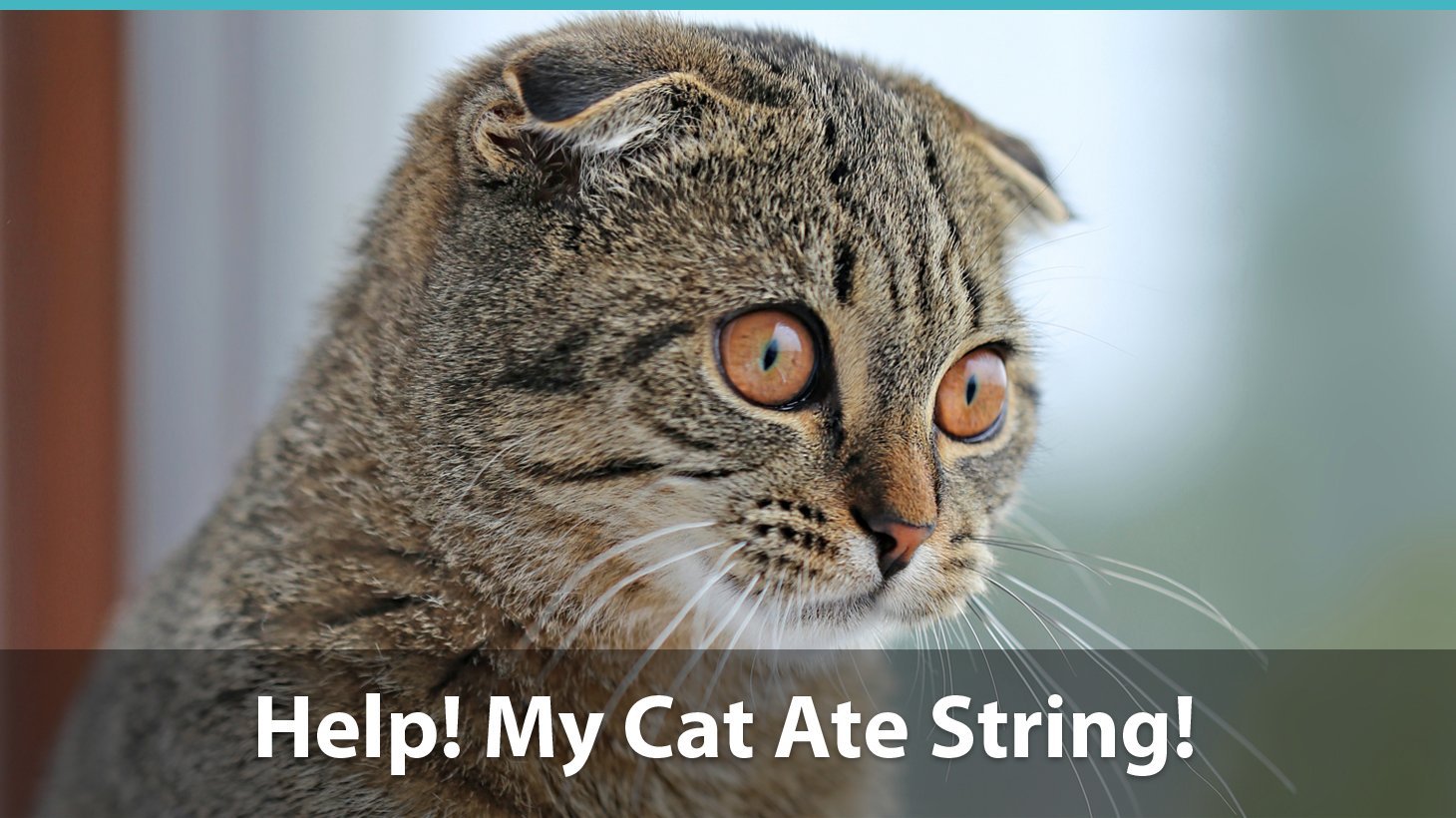Cats find strings and threads to be irresistible. They can be comprised of anything – wool, cord, fishing line, dental floss, sewing threads, yarn – the list goes on and on.
Cats like string for several reasons, and even the laziest kitties out there can become super playful when they get their paws on it.
Unfortunately, string isn’t the safest toy substitute for feline furballs.
Apart from the fact that getting overexcited can lead to harm for any cat, playing with string can lead to several health complications.
Cats can suffocate while rolling around in some threads. And ingesting string can also be fatal. Since cats use their teeth for biting during play sessions, it’s common for them to ingest some of the string while playing with it.
How can you tell if your cat ate string?
So you know your cat was playing with string earlier, and now some of that string has gone missing. Chances are your cat ate it. But how can you tell for sure?
If you see either part of the string coming out of your cat’s mouth or anus, it is obvious that your cat ate it.
If there are no visible signs of the string, you need to monitor your cat for symptoms.
What symptoms will your cat display if it swallows string?
Unfortunately, symptoms likely won’t start appearing immediately. Some cats may not begin experiencing symptoms until several days after they’ve swallowed string.
Other kitties may not show symptoms at all, especially if they’ve fully passed the foreign body out of their system.
Keeping that in mind, here are the symptoms your cat may display over the coming days if it has eaten string.
- Vomiting (and eventually dehydration)
- Unsuccessful attempts to defecate
- Diarrhea
- Lack of appetite
- Pain or swelling in the abdomen area
In the best-case scenario, nature will do its magic, and your cat will pass the string through their gastrointestinal tract. But even if you see string in your cat’s stool, it doesn’t guarantee your cat doesn’t have more in their intestines.
What to do if your cat eats string?
Vets all over the globe constantly have to deal with the ingestion of foreign bodies. If your feline furball indeed swallowed string or thread, don’t start panicking – it’s a common thing.
Remember that if you do see parts of the string coming out of the kitty’s mouth or anus, you must NEVER, ever pull it!
Not only will this cause discomfort to your pet, but in most instances, it will also inflict injury. Your actions may contribute to internal blockage, lacerations, or even the rupture of organ tissue. Both of these outcomes are fatal for your beloved pet, so just don’t pull that string.
Call your vet and schedule an appointment. The doc can carry out a variety of exams to determine if there’s a foreign object inside the cat and if it’s causing any problems. Keep in mind that some of these tests won’t come cheap, and emergency vet fees cost extra. Sadly, if you decide to avoid the trip to your veterinarian’s office, the delay might put your cat’s life in greater danger.
What will happen to your cat?
Hopefully, the string will pass through the furball’s digestive tract without causing any complications.
But there’s a good chance some parts of the string will remain inside your pet’s intestinal tract. Any type of thread (even soft wool) can lacerate the fragile tissue of your kitty’s intestines. And sometimes, other foreign objects, like a needle attached to the thread or string, can complicate things further.
In some cases, rupture, blockage, internal bleeding, infections, and even sepsis may occur. Needless to say, all of these complications can result in a lethal outcome for your pet.
Gastrointestinal obstruction
Gastrointestinal obstruction occurs when a linear foreign body such as string gets stuck in the intestinal tract. As your cat tries to pass the foreign body obstruction through the intestinal tract, it can bunch up, causing a blockage.
Often this occurs when the string gets wrapped around the base of the cat’s tongue, thereby preventing passage. It can also get lodged in the part of the stomach leading to the small intestine.
If the string has blocked the intestinal tract, your feline pal will definitely need surgery as this is a life-threatening issue.
Depending on your veterinarian’s professional opinion and the severity of your cat’s case, the kitty could get away with just a non-surgical endoscopy.
As I mentioned before, dealing with ingested string is something common for veterinarians. While it sounds scary, there’s no need to panic even if your pet needs to undergo surgery.
Tips to help prevent your cat from swallowing string
As often is the case, the best cure is prevention. Here are some tips to reduce the chance of your cat eating string.
- Trim threads off frayed materials like rugs, blankets, sheets, drapes, furniture, and clothing so that your cat is not tempted to chew at them.
- At holiday or celebration time, make sure to keep your cat away from streamers, ribbons, tinsel, etc.
- Keep any string-like material away from your kitten’s access. Keep the floors clean and the carpet vacuumed. And make sure waste baskets are covered.
- If your kitty is a climber, make sure any furniture, counters, window sills, and other places your cat frequently visits are free of string-like debris.
- Always monitor play sessions that include any string toys.
- Ensure your cat’s scratching posts are free of loose rope, strings, and threads.
- If your cat has a stuffed animal, make sure it is in good condition.
- Provide your kitty with plenty of toys like plastic rings, ping pong balls, or catnip mice. Introduce new ones periodically.
- Play with your kitty using a quality wand to appease your cat’s hunting and preying instincts.

